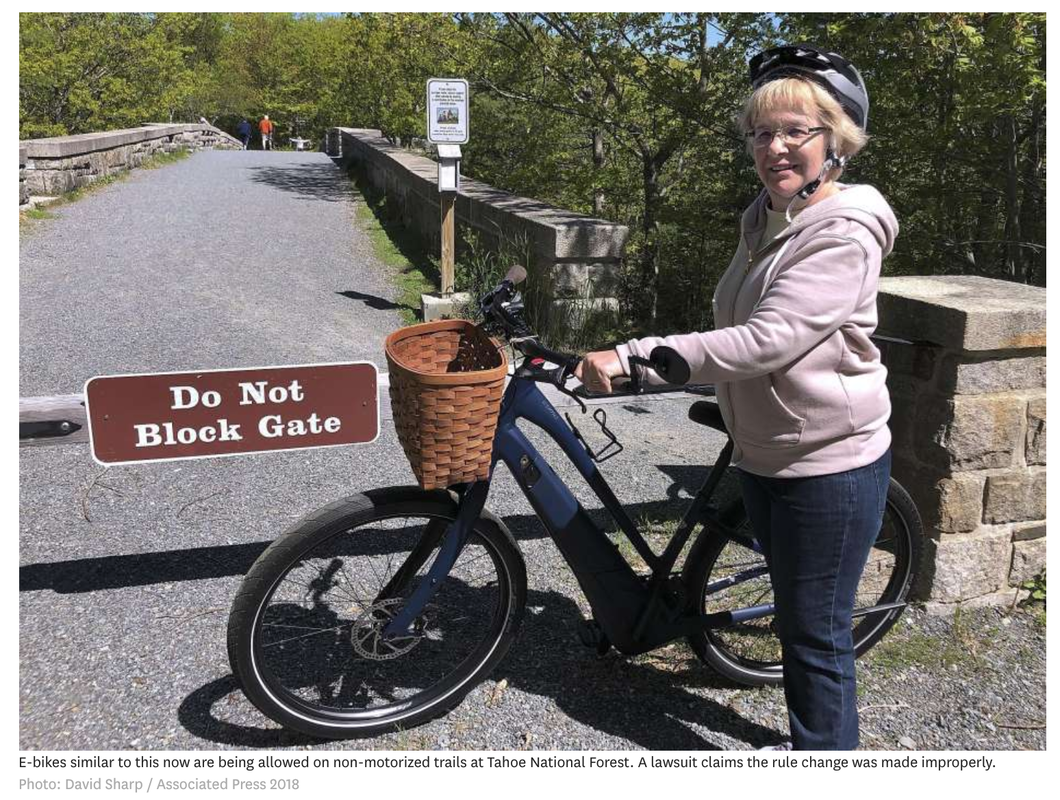The groups claim Tahoe National Forest administrators quietly changed language in its regulations during the summer without first submitting the change to public discourse. The change was noticed by a member of the local chapter of equestrian group Gold Country Trails Council, who spotted marketing information on the Tahoe National Forest website encouraging e-bike riders to come enjoy trails where motorized vehicles had long been prohibited.
“There was no public process,” said Alison Flint, director of litigation and agency policy for the Wilderness Society, one of the groups spearheading the lawsuit. “This was just the forest making the rote decision that it doesn’t need to follow its own laws.”
The lawsuit, which the group said it filed in federal court in Sacramento, seeks to prevent Tahoe National Forest from allowing e-bikes on 130 miles of non-motorized trails. The groups also hope to prevent other national forests in California from following Tahoe’s example, said Randy Rasmussen of Back Country Horsemen of America, one of the stakeholder groups.
The Chronicle was unable to reach a representative of the Tahoe National Forest late Wednesday. The forest website states that starting this year it will “extend opportunities” for riders of low-speed, pedal-assisted e-bikes to use “recommended non-motorized trails across the forest.”
Tahoe National Forest encompasses Truckee and extends northwest of Lake Tahoe, covering 850,000 acres of public land. It hosts a section of the Pacific Crest Trail, among other notable natural features. The Pacific Crest Trail is not among the forest’s recommended trails for e-bikes.
The coalition includes the Wilderness Society, Back Country Horsemen of California, Gold Country Trails Council and others, and is being represented by the Western Environmental Law Center.
On Sept. 10, the coalition sent a formal letter to Tahoe National Forest imploring it to reverse its decision to allow e-bikes on non-motorized trails. Tahoe forest administrators never replied, Rasmussen said. That’s what prompted the coalition to file suit. “The silence is deafening,” he said.
“We’ve given them six weeks and nothing has changed so it’s time to go court,” Flint said.
The change occurred before the Interior Department’s controversial secretarial order in August that permitted e-bikes in national parks, Rasmussen said. Even though the two issues aren’t directly linked — the Forest Service is overseen by the Agriculture Department — Flint said the lawsuit could help stanch rule changes regarding motorized vehicles on other public lands.
“The Interior Department is headed in this direction and we want to stop the Forest Service from heading in this direction,” Flint said.
To Flint’s knowledge, Tahoe is the only national forest that has opted to allow e-bikes on non-motorized.
CLICK HERE to see the original article and photos in the San Francisco Chronicle newspaper.

 RSS Feed
RSS Feed